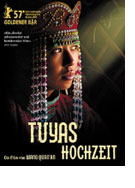

Opening 23 Aug 2007
Directed by:
Quanan Wang
Writing credits:
Wei Lu, Quanan Wang
Principal actors:
Nan Yu, Bater , Sen'ge , Zhaya
Not only the winner of the Golden Bear in 2007, but the NetPac prize as well, and how could it be otherwise. Wang Quan’an manages to capture a part of the one of the vanishing ethnic cultures in Inner Mongolia in a wonderful and humorous tale of a hardworking sheep herder. Although Tuya (Yan Nan) raises two children with a disabled husband, she refuses to change her way of life since she loves the desert. She has an accident making her unable to do the hard work alone. She is given advice to divorce her husband and marry another. But will the new husband take care of the old one? After her divorce, many suitors come from out of nowhere, but in each case the men want the husband to go away. That seems to be logical to most people, but Tuya has a strong sense of who she is and is not willing to sacrifice her husband due to his illness. Tuya is constantly saving Senge, who is a clumsy farmer with a bossy wife who runs off with other men. He finally gets a divorce and sets his sights for Tuya, but first he has to convince her of his honorable intentions. The film is wonderful, and the smallest scenes are full of inner Mongolians' ways of life and the laughter which makes these people endearing.
This film won first prize (Golden Bear) at the 2007 Berlinale. At the press conference, Quan’an said his mother was born near the location where they filmed. What was interesting was to actually see the actress Yan Nan. She is not only a slight and small but a beautiful Chinese woman dressed in fancy modern clothes. It was hard to imagine her transformation into this strong-willed inner Mongolian sheep herder, riding camels and lugging buckets of water across this rough landscape. She said they had to live for months there and learn how to ride a camel; she tried to integrate in the way of life there. Some actual Mongolians from the area had to travel two days to get to the set each time. Quan'an was asked how he feels about the recognition that he gets abroad compared to China. His films are not popular in China, yet he often receives awards from foreign festivals. He considers himself a historian who captures this vanishing part of history which China tries to modernize. Most people focus on the future of China and do not look backwards as to what was wonderful about China. We are lucky that Quan’an has this foresight since China is changing so fast, and most likely all these traditions will be gone in the next ten years. His next film will take place in Xian, home to a Moslem community. (Shelly Schoeneshoefer)